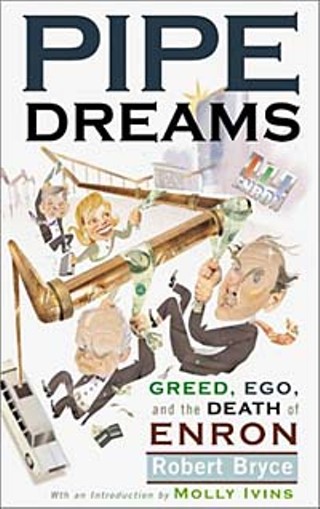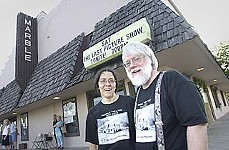Book Reviews
By James McWilliams, Fri., Oct. 25, 2002

Pipe Dreams: Greed, Ego, and the Death of Enron
by Robert BrycePublicAffairs, 394 pp., $27.50
How unhinged from reality had the Houston-based giant become? How morally bankrupt? Here's a taste: Enron once chartered a private plane so that an executive could make a $100,000-a-day trip to South Africa while the company was firing employees making $30,000 a year. That's pretty much a random example, one among hundreds, and those who followed the Enron scandal in the papers will find many of the anecdotes peppering Pipe Dreams to be depressingly familiar.
But there's nothing familiar about what Robert Bryce has accomplished in this superb book. By explaining not just what happened during "the most egregious example of executive piracy in American corporate history," but rather why it happened, the former Austin Chronicle reporter raises a more momentous question: Does Enron reflect corporate America? Fortunately, Bryce doesn't conclude that Enron embodied common business practice. Nevertheless, in this meticulously researched account of the company's demise, one cannot help but notice that Enron's suicidal leap took place off a high dive supported by relatively standard corporate machinations and humdrum political cronyism. These tactics were only taken to a new extreme within Enron. "And yes," Bryce assures us as he dissects these Byzantine practices with sharp and lively prose, "it's confusing." Confusing, but the whiz kids at Enron pulled it off so easily.
Enron never had cash. Nevertheless, its revenue reports, and thus its stock price, soared throughout the late 1990s, transforming Enron into the golden exemplar of the "new new thing," as well as the warm and fuzzy love child of supposedly brilliant Wall Street analysts. Bryce, when not describing a testosterone-fueled executive culture prone to titty bars and race cars, dedicates considerable space to explaining this paradox. Such a daunting task leads him into the subterranean world of "mark to market accounting," "derivative trading," "gas banks," and "total return swaps." Relax. Bryce presents this stuff with such admirable clarity that even the most numerically illiterate English major can grasp its gist. It goes something like this: As Jeff Skilling transformed Enron from a company that sold gas to a company that traded about 800 products, the demand for capital exceeded cash inflow. To sustain a pie-in-the-sky stock price as the debt exponentially bloated, Enron's wizards inflated revenue. They did so by including "wild-ass" profit projections on its current balance sheet (an accounting tactic approved by the SEC under Bush pere) and turning debt into profit by selling it to phantom companies with eerie names like Chewco and Raptor (a tactic never approved by anyone, but profitably overlooked by "the big five" accounting firms). If that makes no sense, how's this: Ken Lay bought the graveyard, Skilling dug the hole, and Fastow buried the body. The body, of course, was hulking debt.
Although Bryce deals very little with the thousands of men and women who travel coach, we know that they were ruined by this morbid burial. It would be a perverse relief to conclude that Enron's power brokers were just a bunch of stupid dudes. But their golden credentials and cynical maneuverings belie such a generous assessment. Their actions instead suggest more evil genius than stupidity. We've always thought -- based on nothing more than their complacent mugs in the paper -- that, had we a chance to know them, we would despise Jeff Skilling, Andy Fastow, and "Kenny Boy" Lay. And as Bryce digs up the bodies, we now have the deepest faith in our moral accounting.








